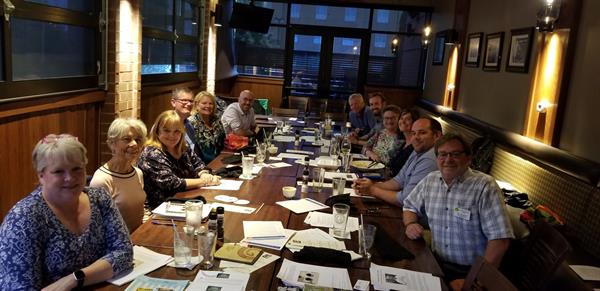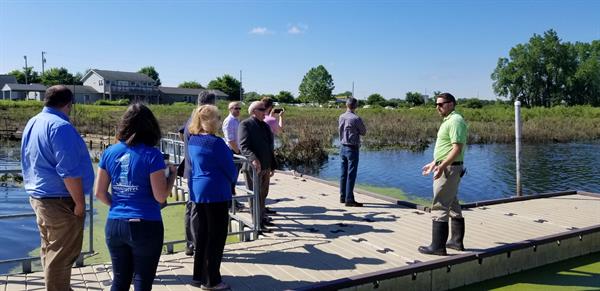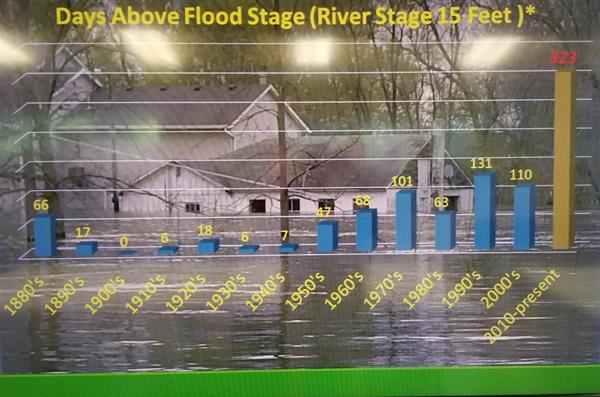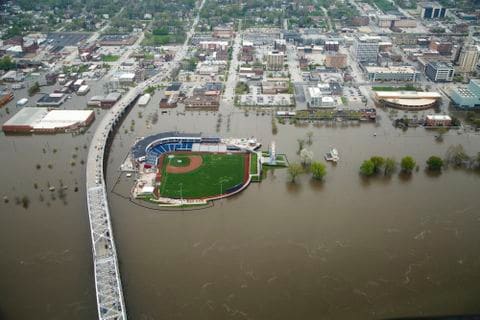Tim Wagner, Agriculture Outreach Coordinator
Anyone who has paid attention to the news this past spring knows about the severe flooding that has plagued Upper Midwest farm country. In addition to the direct and disastrous impacts on people, the flooding is also causing major problems for agriculture. In states like Iowa and Illinois, “normal” years see nearly all of the crops planted by the end of May. On June 1st of this year, however, roughly 50% of Illinois’s corn crop still was not in the ground, and Iowa wasn’t doing much better. While those numbers have been climbing in the past weeks, farmers are coming to realize that some fields simply won’t get planted this year, resulting in lost income and economic activity for rural economies.
The issue of flooding was part of a roundtable discussion held in Davenport, Iowa, on the evening of June 19. Lawmakers from local officials to state senators gathered with members of advocacy organizations – including the League – to work together on obtaining emergency funding, improving agricultural and farming practices, preserving wetlands throughout the farm belt, preventing soil loss, and bolstering community resiliency in the face of increasingly unpredictable weather events.
As the League’s delegate at the roundtable, I was grateful for the number of elected officials who took time from their busy schedules to attend this important discussion. Legislators present included Iowa State Representatives Cindy Winckler, Monica Kurth, Mary Mascher, and Chuck Isenhart; Iowa State Senator Eric Giddens; and Illinois Representative Mike Halpen. Also in attendance were Davenport Mayor Frank Klipsch, and Brian Kramer, staffer for Iowa Congressman Dave Loebsack. The participation of these leaders showed that they care deeply for their many constituents who have been negatively affected by a changing climate.

The roundtable was held at Granite City Food and Brewing in Davenport. Challenging conversations always go better with some accompanying refreshment.
The day after the roundtable, I and other participants toured the Nahant Marsh Education Center, a 305-acre preserve on the Mississippi River in southwest Davenport. We witnessed firsthand the devastation from the recent dramatic increase in flooding events along the river. It was plain to see that the flooding is pushing the marsh ecosystem beyond its functioning capacity. Much of the plant and animal life is visibly becoming stressed beyond its capability to recover.

Nahant Marsh Executive Director Brian Ritter showed us the damage caused to the marsh’s natural environment by repeated flooding.
In addition to what we could see with our own eyes, staff of the Education Center told us that the U.S. Army Corps of Engineers has compiled data showing that the Mississippi River has exceeded flood stage 323 days already this decade, as compared to only 110 times from 2000 to 2009.

U.S. Army Corps of Engineers data showing the number of days the Mississippi River was above flood stage at the Quad Cities in each decade.
During the roundtable and the marsh tour, representatives of groups including the National Caucus of Environmental Legislators, Mississippi River Network, and River Action discussed what Midwest farmers can do to improve the situation. While the frequent flooding along the river is the result of far more extreme rain events related to climate change – a huge issue that will not be easy to solve – the flooding is exacerbated by the increasingly common practice of draining wetlands and installing pattern drainage tile on farms in the upper basin. These intense drainage systems act like a funnel, moving water rapidly towards the river instead of holding it in local soils.
Research shows that flooding can be mitigated by preserving wetlands and changing agricultural practices to depend less on intense drainage tile systems and more on no-till practices, cover crops, and greater crop diversity. These practices have been shown to improve water infiltration by 20 to 30-fold, helping to keep water on the land, instead of sending it down the river. These strategies also build healthier soil, prevent erosion, and help farms function as healthy ecosystems and habitat for wildlife and beneficial insects while still producing higher yields. They also allow the farmer to get back into the field sooner after heavy rainfalls simply because of dramatically improved soil structure.
By the end of the event, the legislators in attendance understood that we need significant changes in farming practices to help keep the water on the land, where it belongs, instead of letting it all run down the river. My fellow advocates and I are glad to have effectively escalated this issue on behalf of Iowans and other people affected by the recent flooding. Together, we can implement strategies that protect both agriculture and off-farm communities.

Together, we can prevent downtown Davenport from looking like this.
Read the Quad-City Times' coverage of the event.
Watch WQAD-8's story about the event.